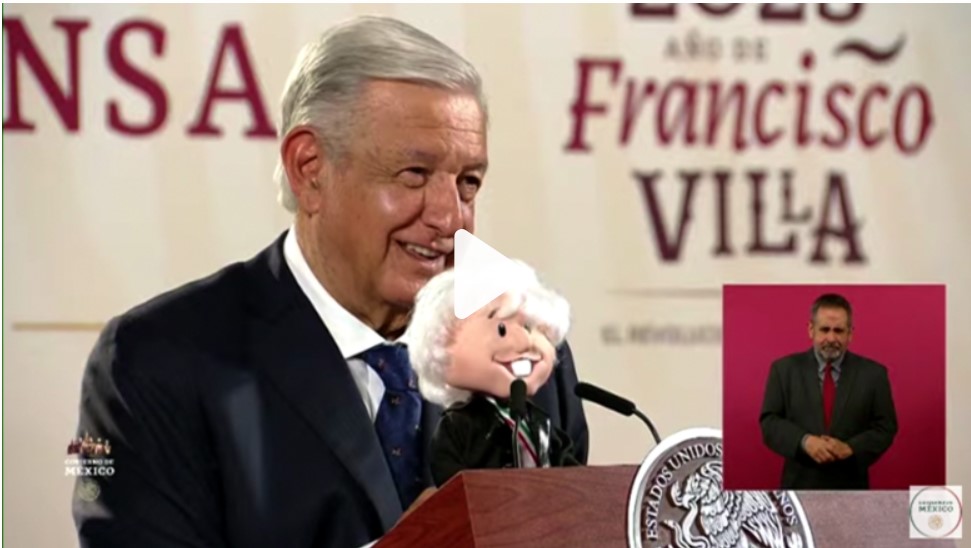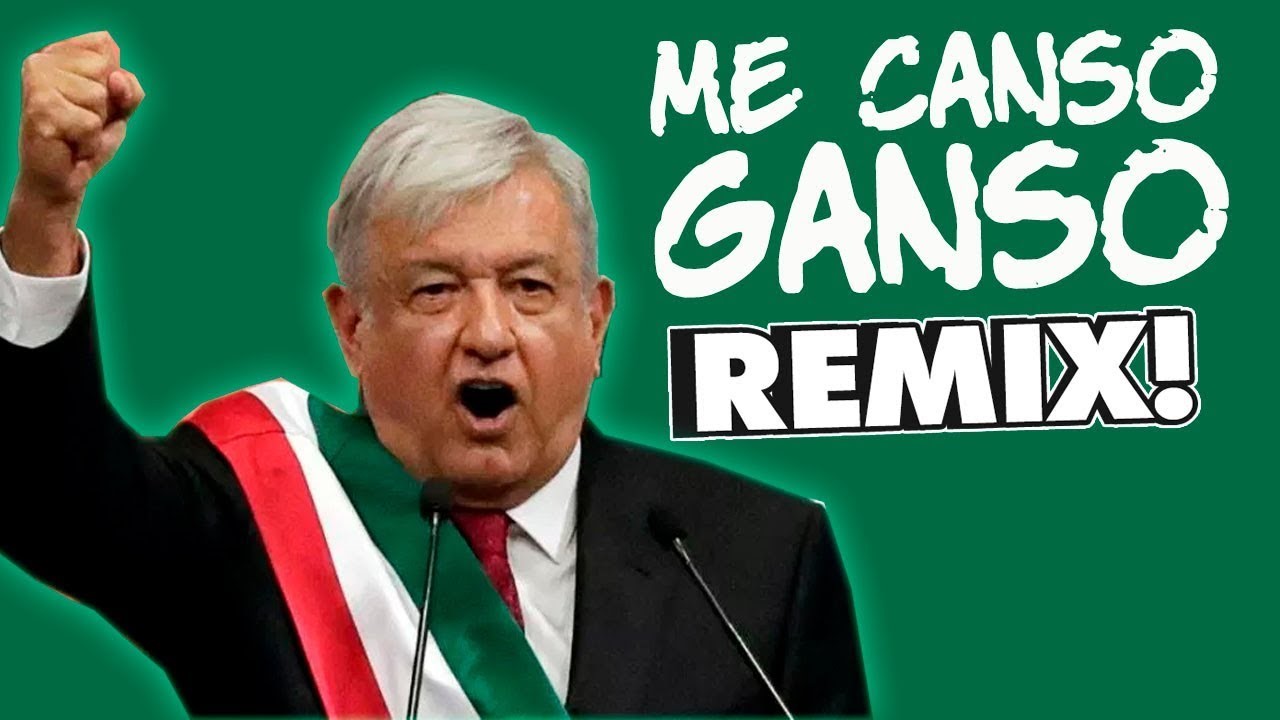|
|
|
|
The weekly newsletter of the México Solidarity Project |
|
|
|
Online at mexicosolidarityproject.org |
|
July 12, 2023/ This week's issue/ Meizhu Lui, for the editorial team |
|
|
A recent mañanera saw AMLO gifted an “AMLITO” doll reading “Me canso ganso!” (I’m on it!)/View video |
|
AMLO’s Mañaneras: As Popular as the Soaps! |
|
Sure, Mexicans love to watch their TV soap operas and game shows. But another TV series these days is giving those programs a real run for their money: the morning press conference — the mañanera — of Mexican president Andrés Manuel Lopez Obrador. This long (it starts every morning at 7 a.m. and can run three hours) and long-running (every weekday since AMLO took office) series has become can’t-miss viewing for millions of Mexicans — who then post their favorite moments on social media.
AMLO also ranks sixth on the Streams Charts list of the most popular Spanish-speaking streamers, beating famous rappers and video gamesters alike. Over the first three months of 2023 alone, AMLO’s mañanera live streams drew an amazing 13.2 million viewing hours.
Why so popular? First, the anticipation. You can’t predict what will happen. Presidential press conferences worldwide tend to be rare, scripted, and boring. But reporters at the mañanera can question AMLO directly, and he answers in layman’s language peppered with humor and colloquial expressions. Then the identification. Listeners feel like their president is talking directly to them as an equal — and voicing their own feelings.
Watching AMLO take down the elite politicians who’ve ripped off the little people can be deeply satisfying. People relish hearing him call out those elites as the “mafia of power” and “fifis.” Sock it to them, AMLO!
Behind the scenes, Jesús Ramirez Cuevas, the coordinator of social communication and a key spokesperson for the Mexican government, helps set the stage. The Mexican news source Sentido Común (Common Sense) recently talked with Ramirez, and we excerpt from that interview in this week’s issue.
Ramirez tends to be self-deprecating about his role, but he’s a brilliant communications strategist in his own right, helping AMLO dodge the blows of the opposition that still controls México’s mainstream media, helping AMLO communicate directly with the common people they both love. No wonder the people love them back. |
|
|
|
Don’t miss an issue! Sign up for a free México Solidarity Bulletin subscription. |
|
|
|
|
AMLO’s Mañaneras: To Govern Is to Communicate |
|
A journalist, documentarian, and writer, Jesús Ramirez Cuevas coordinates social communications for the current AMLO government. He created and now edits Regeneración, the Morena party’s official publication. Ramirez has also produced and directed a number of films, including several about the Zapatista movement. The Mexican magazine Sentido Común (Common Sense) interviewed Ramirez recently. We present some excerpts here, edited for clarity. |
|
|
Sentido Comun: Every weekday AMLO has a morning press conference, a mañanera. How do these differ from the press conferences he gave as the mayor of México City from 2000 to 2005?
As mayor, AMLO governed as more a traditional politician. But as the presidential candidate of a new party, he made himself into a political figure outside of the old system. Since becoming president in 2018, his style has become more popular, direct, and clear.
After 2018, for the first time, AMLO began using humor, and doing something that was formerly unthinkable for a tough politician. He began to humanize himself. He speaks personally, in his own voice and style.
Yes, AMLO has the help of a group of colleagues, but unlike other politicians, coached on how to smile and what to say and when, he breaks with those traditional forms of political marketing and creates a new form of political communication.
AMLO presents a new reality. He gives the historical background. He presents his projects, his alternatives. I invite you, the people, to join us, he says. The mañaneras have become more than an axis of communication. They have become the axis of government, in the sense that the people are learning what decisions are being made and why and how projects are progressing. They’re experiencing the substance of political debate.
For the first time, the people have a flesh-and-blood representative, no longer just an abstraction making speeche in a vacuum. AMLO is speaking to the people. The mañanera is not for the journalists, not for the media, not even for the politicians. In the communication process, the people see their president as the political subject — and take him seriously. This constant communication has increased his power.
AMLO talks a lot about history, doesn’t he, not just current affairs?
AMLO has the ability to tell the history of México from his perspective, with humor, culture, and music. This opens up people’s minds to stories that had been buried by previous administrations. Let's remember that neoliberalism closed memory, closed history, and, in so doing, closed the nation's independence project.
Back in 2010, under a neoliberal government, the political debate revolved around how we integrate into the United States. We had lost the Bolivarian dream of an independent, united Latin America. The market, they told us, amounted to our only choice. To integrate with the United States, we had to erase our historical memory.
AMLO is helping us recover our memory and history. The politician has become the teacher. He shares his historical knowledge, his political reading of history, to help us reflect on and understand the present. He is presenting us with a rare opportunity. From academia, we mostly get historical anecdotes, questions that don’t orient us politically — for example, did Pancho Villa escape dressed as a woman or not, or is that story just an urban myth? |
|
What difference is there between the first mañaneras in 2018 and those today?
The first ones focused much more on trying to explain why we were doing what we were doing, because everything was happening so fast that even the government officials themselves asked where are we going. We had no time for “we’re going to do some studies, we’re going to do a feasibility analysis, we’re going to create a budget and then maybe in two or three years we’ll see where we can move forward.” |
|
|
In an announcement about the fast timeline for Tren Maya, AMLO threw in a quote from a famous Mexican comedy that went viral. The rough translation: |
|
Andrés Manuel was moving fast: Let’s go here for this, for that. At the mañanera, he would explain what had already happened, almost like describing a train that had already passed. You learned where it passed and why. But now he talks more about where we are going. He engages in political debate with the opposition. Why is there opposition? What are the causes? Why does it oppose the fourth transformation? The mañaneras have become much more of a debate. |
|
How do you and AMLO prepare? Do you meet five minutes beforehand? Do you set the agenda and prepare materials?
AMLO and I both know the issues of the day. I’m at cabinet meetings, so I can see what materials we can use. We consult, and AMLO will ask me to find information for him. I have various functions, and only one of them is producing the mañaneras. |
|
|
Foto: J. Raúl Perez |
|
AMLO takes questions and responds without any written notes in hand. Sometimes I’ll pass him a note card with a specific piece of information about something that’s happening — for example that Ecuador has dismissed the National Assembly — so he will be informed, nothing more. He comes up with his own answers. |
|
You don’t see the mañaneras as a traditional press conference. How do you see them?
The mañaneras are constructing the narrative of the 4T, the Fourth Transformation. They take into account information — and disinformation. We inform the people where that disinformation is coming from.
We let people know the agenda we want to set. We cannot let the opposition set the agenda by derailing us with non-issues, and that is why AMLO does not address the falsehoods directly. He may address them sideways, or go the other way.
Our communications have put in place a different political culture, one where people see how the president governs, the circumstances in which he is governing, and how he thinks in order to make decisions. So people feel informed, people feel empowered. They feel that we are paying attention to them, democratizing the country and constructing a citizenry with the tools and desire to exercises its rights.
You see the mañanera as the core of governance. To communicate is to govern, to govern is to communicate.
We aspire to represent the interests of the people, and so we don’t just talk, we listen. |
|
|
Who’s Afraid of Xóchitl Gálvez? |
|
It looks like Mexico’s opposition has found its candidate for the 2024 presidential race: Bertha Xóchitl Gálvez Ruiz. The opposition still has to go through a formal process to pick its candidate, but several of her would-be rivals have already dropped out. Her rivals perceive a race tilted in her favor. |
|
Mexican President López Obrador, meanwhile, has proclaimed in his mañanera that the opposition primary contest just amounts to political theater and that, ultimately, the mastermind behind the opposition coalition, business magnate Claudio X. González, will have the final say. |
|
|
Gálvez’s political resume? Short and uninspiring. She ran and lost the race for governor of her home state of Hidalgo in 2010 and served one term as borough mayor in México City. Gálvez currently sits as an indirectly elected senator from the party list of the right-wing National Action Party, the PAN. Gálvez has evidently been picked as the opposition’s candidate in part because of her humble origins and self-claimed Indigenous identity as a child born into a working-class family with an Otomí father and a mestiza mother. Upon throwing her name in the race, her background quickly became the topic of discussion, suggesting that her status as a woman of Indigenous ancestry will be instrumentalized in the upcoming race and featured throughout. But critics have already dug up an old interview where Gálvez talks about being white and having white skin. We’ve seen regular instances of people falsely claiming to be Indigenous over recent years. I’ve learned that when it comes to this issue, instead of asking what people claim to be, we ought to ask, “Who claims you?” Despite her charity work with Indigenous peoples in the 2000s, Gálvez is not generally viewed as a champion of Indigenous peoples. Instead she is mostly known for her theatrics. She recently wore a dinosaur costume in the Senate, chained herself to a chair in an attempt to disrupt proceedings, and, most recently, showed up to the National Palace demanding to be let in and allowed to address the president’s mañanera. Much of the Mexican punditry has tried to float the narrative that López Obrador’s party, Morena, somehow “fears” a Xóchitl Gálvez candidacy. Only those totally out of touch with the Mexican population would draw such a conclusion. Morena does not fear Gálvez at all. One sign of just how much the López Obrador presidency has shifted the public debate: Gálvez began her candidacy with a video defending his social programs. Gálvez now even claims she got her start in politics with the Trotskyist Liga Obrera Marxista. But prominent Mexican Trotskyists like Edgar Sánchez deny she ever sat in their circles. Sánchez sees her claim as a “marketing stunt” aimed at winning support from Mexico’s working class. Gálvez will ultimately enter the 2024 race as the representative of the right-wing Va por México coalition. Despite her promises to maintain AMLO’s popular social programs and to portray herself as leftist, Gálvez and PAN represent the ancien régime and the oligarchs desperate to return to power. Mexican voters fell victim to slick political marketing in the 2012 presidential race that resulted in Enrique Peña Nieto’s election. After that disappointment, and with the contrasting experience of living during López Obrador’s period as president, they won’t be fooled this time around into voting for a conservative dressed in a huipil. |
|
José Luis Granados Ceja, a Mexican freelance journalist, is currently studying human rights and popular democracy at the Autonomous |
|
|
|
Recent news reports and commentaries, from progressive and mainstream media,
Edwin Ackerman, The AMLO Project, New Left Review/Sidecar. AMLO’s overarching project has been to move away from neoliberalism. To what extent has he succeeded, and what can the left learn from his endeavor?
Amarillismo sobre inseguridad aumentará si no logran inflar a Xóchitl: AMLO, Contra Línea. La violencia en México no se ha exacerbado, consideró el presidente Andrés Manuel López Obrador al tiempo que advirtió que si existe una percepción en ese sentido se debe al amarillismo de los medios con propósitos politiqueros.
López Obrador slams DeSantis-backed immigration law, Prensa Latina. AMLO is blasting the anti-immigration law shoved into law by Florida Governor Ron Desantis. The Mexican leader has also accused the U.S. mainstream press of spreading the fake news that migrants bring drugs into the United States.
Gabriela Soto, Ocho políticos y cuatro ciudadanos (hasta ahora) buscan la candidatura presidencial del frente opositor, Animal Politic. Aún está pendiente la decisión de Ildefonso Guajardo, Miguel Ángel Mancera y Demetrio Sodi.
México’s old ruling party has fractured, following the loss of the last major state it governed, Associated Press. The PRI held the presidency and almost all statehouses in México without interruption for 70 years.
Sistema alimentario en México en manos de trasnacionales, señala estudio, La Coperacha. Corporaciones como Bayer-Monsanto, coludidas con funcionarios, frenan políticas y leyes sobre salud y alimentación del país.
Thomas Knapp, US War on México Wouldn’t Win the US War on Drugs, CounterPunch. The US government has been fighting — and losing — a “war on drugs” for most of a century now.
Pedro Miguel, Claudio en su laberinto, La Jornada. Lo que no son capaces de entender los ideólogos de la derecha es que la engañifa no tiene futuro, porque el país cambió como resultado de un movimiento de millones comprometidos con la regeneración.
Imogen Lepere, Three sisters and 120 sweet potatoes: Mexican farmers embrace Maya traditions, Guardian. Mestiza de Indias has become just one of numerous projects aiming to preserve the Yucatán peninsula’s biodiversity, as well as the agricultural heritage of its Indigenous peoples, who live in greater density here than anywhere else in México.
Tribunal falla contra Radio Tosepan para obligarla a transmitir spots políticos, Desinformémonos. El Tribunal Electoral del Poder Judicial de la Federación ha fallado contra la radio comunitaria Radio Tosepan Limakxtum y emitió una sentencia en la que obliga al medio comunitario a transmitir spots de partidos políticos en su programación, a pesar de que viola sus derechos como pueblos indígenas en materia de autonomía y comunicación. |
|
|
The Mexico Solidarity Project brings together activists from various socialist and left organizations and individuals committed to worker and global justice who see the 2018 election of Andrés Manuel López Obrador as president of México as a watershed moment. AMLO and his progressive Morena party aim to end generations of corruption, impoverishment, and subservience to US interests. Our Project supports not just Morena, but all Mexicans struggling for basic rights, and opposes US efforts to undermine organizing and México’s national sovereignty.
Editorial committee: Meizhu Lui, Bruce Hobson, Bill Gallegos, Sam Pizzigati, Courtney Childs, Victoria Hamlin, Agatha Hinman, Peter Shapiro, Daniel McCool, Jesús Hermosillo. To give feedback or get involved yourself, please email us! |
|
|
|
Subscribe! Get the México Solidarity Bulletin in your email box every week. |
|
|
|
Web page and application support for the México Solidarity Project from NOVA Web Development, a democratically run, worker-owned and operated cooperative focused on developing free software tools for progressive organizations. |










